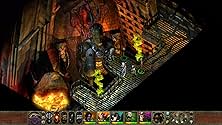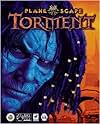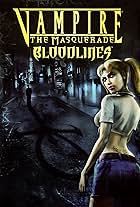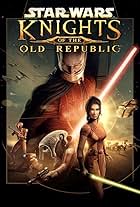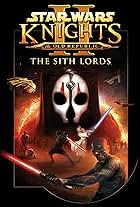IMDb RATING
9.3/10
2.2K
YOUR RATING
In the city of Sigil, the only place from which all realities of the Planescape universe can be reached, an immortal amnesiac, the Nameless One, must uncover his past, the mystery of his imm... Read allIn the city of Sigil, the only place from which all realities of the Planescape universe can be reached, an immortal amnesiac, the Nameless One, must uncover his past, the mystery of his immortality as well as who's trying to kill him.In the city of Sigil, the only place from which all realities of the Planescape universe can be reached, an immortal amnesiac, the Nameless One, must uncover his past, the mystery of his immortality as well as who's trying to kill him.
- Awards
- 1 nomination total
Jennifer Hale
- Fall-from-Grace
- (voice)
- …
Mitch Pileggi
- Dak'kon
- (voice)
Charlie Adler
- Ignus
- (voice)
- (as Charles Adler)
Rodger Bumpass
- Strahan Runeshadow
- (voice)
- …
Keith David
- Vhailor
- (voice)
Flo Di Re
- Ravel Puzzlewell
- (voice)
Tony Jay
- The Transcendent One
- (voice)
Judi M. Durand
- Additional Voices
- (voice)
- (as Judi Durand)
Greg Finley
- Additional Voices
- (voice)
Featured reviews
The computer role-playing game industry was supposed to be dead. If it wasn't dead, surely it was dying. As advances in CPU speeds and 3D accelerators continued the push for 3D games that would showcase these technologies, seemingly groundbreaking games such as Half-Life, Unreal, and Quake III Arena threatened to become the final nail in the computer role-playing coffin.
Then Interplay and Black Isle Studios brought them back. Fallout and Baldur's Gate were the first twitches of life the CRPG genre had seen in years, and Planescape: Torment signals the full recovery of the breed.
Fittingly, PS:T is centered around The Nameless One, an immortal whose memories decay in each brush with death. You assume the role of The Nameless One just as he pulls himself off a slab in the Mortuary once again. It's up to you to re-discover who you are, or were, and piece together the story that placed you in this situation.
It's quite a story, and a good one at that. Although the game features stunning graphics and incredible audio, it's the detailed and involving text that immerses you in the Planescape multiverse. Book reviewers often describe a title with an excessively compelling story as "a page turner" or "one you won't want to put down." Moreso than any other computer game, PS:T falls into that category. This is as close to an interactive novel as anything produced to date.
You not only play PS:T, you read and write it as you go along. Decisions made at one juncture have a real and concrete effect on the outcome of later events. This game rewards reason and favors experimentation and the thoughtful solution. If your idea of a good time is hacking and slashing your way to glory, you may want to steer clear of this game, unless you're ready to see your style of play undergo a complete transformation.
Technically speaking, PS:T isn't as 'cutting edge' as the latest Quake-clone, but that's not such a bad thing. PS:T is a world unto itself, with incredible artwork, detailed animation, immersive audio, and tons of replayability. Most folks, once they've played through PS:T and witnessed the ADJECTIVES! ending, will immediately start the game again, just to see the outcome of the path not taken.
Personally, I believe that Black Isle should be commended for such an outstanding and original effort, especially in these days of "what can I kill next" mediocrity. The merits of PS:T cannot be overstated, though any attempt to describe the experience is doomed to miss the mark. It's a great game, there should be more like it.
Then Interplay and Black Isle Studios brought them back. Fallout and Baldur's Gate were the first twitches of life the CRPG genre had seen in years, and Planescape: Torment signals the full recovery of the breed.
Fittingly, PS:T is centered around The Nameless One, an immortal whose memories decay in each brush with death. You assume the role of The Nameless One just as he pulls himself off a slab in the Mortuary once again. It's up to you to re-discover who you are, or were, and piece together the story that placed you in this situation.
It's quite a story, and a good one at that. Although the game features stunning graphics and incredible audio, it's the detailed and involving text that immerses you in the Planescape multiverse. Book reviewers often describe a title with an excessively compelling story as "a page turner" or "one you won't want to put down." Moreso than any other computer game, PS:T falls into that category. This is as close to an interactive novel as anything produced to date.
You not only play PS:T, you read and write it as you go along. Decisions made at one juncture have a real and concrete effect on the outcome of later events. This game rewards reason and favors experimentation and the thoughtful solution. If your idea of a good time is hacking and slashing your way to glory, you may want to steer clear of this game, unless you're ready to see your style of play undergo a complete transformation.
Technically speaking, PS:T isn't as 'cutting edge' as the latest Quake-clone, but that's not such a bad thing. PS:T is a world unto itself, with incredible artwork, detailed animation, immersive audio, and tons of replayability. Most folks, once they've played through PS:T and witnessed the ADJECTIVES! ending, will immediately start the game again, just to see the outcome of the path not taken.
Personally, I believe that Black Isle should be commended for such an outstanding and original effort, especially in these days of "what can I kill next" mediocrity. The merits of PS:T cannot be overstated, though any attempt to describe the experience is doomed to miss the mark. It's a great game, there should be more like it.
10graef
After playing adventure and computer roleplaying games for almost 2 decades I can clearly say that this was one of the best, if not *the* best experience I had sofar.
The game sets itself appart from other games of the genre that (over-)used classic medieval or tolkien-style fantasy. Instead it introduces us to a completely new fantasy setting originating in the Planescape universe of the AD&D pen & paper roleplaying series. The story is extremly interesting, non-linear and full of surprises until the very end of the game. Characters and quests are very well developed and although the game has countless side quests and interesting choices for the player, I never felt that I got lost in the game or stuck. The game features lots of dialog that truly contributes to the storyline, immersion of the player and presents content and choices that are truly part of the game advancement rather than a tedious cosmetic add-on found in many other hack-and-slash roleplaying games. The combat system is interesting and well balanced. While combat and character development do play vital roles in the game, they are by far not as excessive or repetitive as in most RPG games like e.g. Icewind Dale or even the classic Ultima series. Every dungeon crawl is followed by at least one interesting NPC encounter. Quite often long and complex quests that are not related to combat, such as investigating a crime, create a good balance between combat and dialog/exploration that may be somewhere around 50:50, which I felt very comfortable with.
Although at the very beginning things might look a little bit confusing for newbies, this game is both interesting to the RPG veteran and still suitable for the occasional or less experienced player. The reason are the many new elements of the game, the lack of really fatal mistakes in character development, absence of hardcore puzzles and the length of the game itself. This game can be completed in reasonable time, while still offering many hours of entertainment and an almost unprecedented depth of the story. The trick lies in the removal of almost all redundant and repetitive tasks that you find in many other RPGs. This makes Planescape such a dense experience. Every hour of gameplay is full of interesting content and when playing, unlike in most other RPGs, I never felt forced to "work" towards a goal. Instead, discovery, achievement and story-telling are combined in a very clever way. Even after you complete this game you will not regret the time you have spent on it. The biggest problem will rather be, that you find yourself looking forward to a sequel. A true piece of art!
The game sets itself appart from other games of the genre that (over-)used classic medieval or tolkien-style fantasy. Instead it introduces us to a completely new fantasy setting originating in the Planescape universe of the AD&D pen & paper roleplaying series. The story is extremly interesting, non-linear and full of surprises until the very end of the game. Characters and quests are very well developed and although the game has countless side quests and interesting choices for the player, I never felt that I got lost in the game or stuck. The game features lots of dialog that truly contributes to the storyline, immersion of the player and presents content and choices that are truly part of the game advancement rather than a tedious cosmetic add-on found in many other hack-and-slash roleplaying games. The combat system is interesting and well balanced. While combat and character development do play vital roles in the game, they are by far not as excessive or repetitive as in most RPG games like e.g. Icewind Dale or even the classic Ultima series. Every dungeon crawl is followed by at least one interesting NPC encounter. Quite often long and complex quests that are not related to combat, such as investigating a crime, create a good balance between combat and dialog/exploration that may be somewhere around 50:50, which I felt very comfortable with.
Although at the very beginning things might look a little bit confusing for newbies, this game is both interesting to the RPG veteran and still suitable for the occasional or less experienced player. The reason are the many new elements of the game, the lack of really fatal mistakes in character development, absence of hardcore puzzles and the length of the game itself. This game can be completed in reasonable time, while still offering many hours of entertainment and an almost unprecedented depth of the story. The trick lies in the removal of almost all redundant and repetitive tasks that you find in many other RPGs. This makes Planescape such a dense experience. Every hour of gameplay is full of interesting content and when playing, unlike in most other RPGs, I never felt forced to "work" towards a goal. Instead, discovery, achievement and story-telling are combined in a very clever way. Even after you complete this game you will not regret the time you have spent on it. The biggest problem will rather be, that you find yourself looking forward to a sequel. A true piece of art!
This was the most fantastic game I have ever played. And that's saying a lot. I have been a huge fan of the Planescape setting for many years now, and this game brought Sigil to life like I never thought possible. The game was pretty much exactly how I pictured everything to be... The buildings, the speech, the entire atmosphere. It was amazing. I have never been so immersed in a game before. The characters were deep and I found myself truly caring about them. The story was so engrossing and unique... so deliciously tragic. I loved every bit of it. Finally, the music added just the right flavor to set the mood of every scene and place. I just can't put into words how wonderful this game is. It is truly my favorite game ever! Thanks to everyone involved with the game for bringing the world of Planescape to life so beautifully!
10Rondum
I think that this is a really strong release from Interplay. It`s much more emotional than their other games, that`s why I like Plane Scape Torment so much! I would say that this is the best spent money ever, the game seem to last forever.
10Merik
This game is nothing short of a work of art, plane and Sigil.
Torment is set within the wonderfully unique Planescape setting for (A)D&D, one of the most original roleplaying settings to ever be created. Put simply, the "normal" world, real and standard D&D, is called the Prime Material Plane... And Planescape is a long walk away from the nearest Tolkien-ish elf or dwarf. The Inner Planes are infinities of pure elemental power, of the four basic elements of alchemy, along with life and death energy, and how these all mix. The Outer Planes are the infinities created and shaped by belief -- heavens and hells of all kinds, related to the various "alignments" of good, evil, law, and chaos; and all home to the gods of any pantheon you could name, as well.
This is quite a backdrop to place the events surrounding a single human, but the game does it excellently. Torment is mostly (mainly because this is where you'll be building up a lot of early levels and getting used to the game and quests) set in Sigil, a curious city built in the center of a ring, floating above an infinitely tall Spire at the center of all the multiverse (maybe). Sigil can only be reached through magic portals, and these portals can be found in almost any bound space (like a doorway), and can be used as long as someone has the proper key (an item, a thought, a song they're singing at the time, a gesture, etc). These portals go *every*where.
Now, the actual story... Waking up, with no memory of who he is, the Nameless One finds himself in the Mortuary of Sigil, surrounded by zombies and a very strange skull -- which flies around about 5 and a half feet up, has eyes, and a wit sharper than a magic sword. The game just flows from there, into a tale of self-discovery and the most compelling objective I've seen in an RPG, so counter to what one does in most: the Nameless One wants to find a way to die. His mortality has been taken away, and while this gives him a phenomenal healing rate and some strange powers -- as well as great potential for incredible power in more "traditional" areas such as warcraft, thievery, or wizardry -- it is a curse in disguise as he loses his memories and will eventually lose his mind totally every time he takes wounds enough to kill anyone else of similar skill (read: level and hit points).
The best part of the story is learning it for yourself, but it's not spoiling anything to relate the matter of the Nameless One's immortality and healing speed, or similar. The writing itself is some of the best I have seen, and make it an extremely compelling story unfolded through all the dialog and related writing. Unique items and spells are full of history in their descriptions, and just getting some of these unique spells provides an opportunity to experience the skilled writing, and helps so much to make one of the characters a very real figure.
Ah, yes, the characters. There are a number of companions you may eventually gain, though you are limited to a total of six members in your party. Morte is the skull already mentioned, and he is perhaps the most interesting character (after the Nameless One, of course). Talk long with him every time something related to him happens in the game, and you will learn of the depth of the character. Dak'kon is a githzerai, a member of a race once descended from humans but now much different. His story is very nearly as deep as Morte's, and has direct consequences on his strength in combat, through his blade. Annah is a young tiefling woman, strong-willed and valuable, related somewhere in her family history to the tanar'ri -- demons. While her story is not as important, it provides some very human depth to the Nameless One and the overall tale. Ignus is a mad mage who wields fire like anyone else might use a dagger. His story is far from essential, but it is another interesting facet of the Nameless One's history (it seems everything in this game ties into the Nameless One's history, somehow). Fall-From-Grace is a succubus, a demonic temptress who has turned away from evil and chaos. Instead, she wields the healing magics of the priests. For the story, she is not as important as others, though just the quirk of her nature is interesting. Nordom has to be the most unique character of all. "Backwards modron > Nordom" he states as soon as Morte makes a sarcastic observation. Some explanation is in order: a modron is a semi-robotic creature of pure law from the regulated clockwork plane of Mechanus. Nordom, being a backwards modron, is a rogue, a modron who has been infected by chaos and made into an individual. He and Grace are perhaps the only ones not already tied up in the Nameless One's past. Finally, the last character you may add is Vhailor. Strange, to say the least, Vhailor is a suit of armor inhabited by an undead spirit devoted to Law and Justice. His story is important almost solely for the ending -- but that's all I'll say.
The final act to Torment is excellent. The story is revealed finally, but not too much -- the authors knew where to stop before ruining it. There are a number of different ways to end the game, with some varying amounts of satisfaction depending on how much you liked the other characters.
A beautiful game. I'm on my third or fourth time through it, and I still love it and am still finding new things.
Torment is set within the wonderfully unique Planescape setting for (A)D&D, one of the most original roleplaying settings to ever be created. Put simply, the "normal" world, real and standard D&D, is called the Prime Material Plane... And Planescape is a long walk away from the nearest Tolkien-ish elf or dwarf. The Inner Planes are infinities of pure elemental power, of the four basic elements of alchemy, along with life and death energy, and how these all mix. The Outer Planes are the infinities created and shaped by belief -- heavens and hells of all kinds, related to the various "alignments" of good, evil, law, and chaos; and all home to the gods of any pantheon you could name, as well.
This is quite a backdrop to place the events surrounding a single human, but the game does it excellently. Torment is mostly (mainly because this is where you'll be building up a lot of early levels and getting used to the game and quests) set in Sigil, a curious city built in the center of a ring, floating above an infinitely tall Spire at the center of all the multiverse (maybe). Sigil can only be reached through magic portals, and these portals can be found in almost any bound space (like a doorway), and can be used as long as someone has the proper key (an item, a thought, a song they're singing at the time, a gesture, etc). These portals go *every*where.
Now, the actual story... Waking up, with no memory of who he is, the Nameless One finds himself in the Mortuary of Sigil, surrounded by zombies and a very strange skull -- which flies around about 5 and a half feet up, has eyes, and a wit sharper than a magic sword. The game just flows from there, into a tale of self-discovery and the most compelling objective I've seen in an RPG, so counter to what one does in most: the Nameless One wants to find a way to die. His mortality has been taken away, and while this gives him a phenomenal healing rate and some strange powers -- as well as great potential for incredible power in more "traditional" areas such as warcraft, thievery, or wizardry -- it is a curse in disguise as he loses his memories and will eventually lose his mind totally every time he takes wounds enough to kill anyone else of similar skill (read: level and hit points).
The best part of the story is learning it for yourself, but it's not spoiling anything to relate the matter of the Nameless One's immortality and healing speed, or similar. The writing itself is some of the best I have seen, and make it an extremely compelling story unfolded through all the dialog and related writing. Unique items and spells are full of history in their descriptions, and just getting some of these unique spells provides an opportunity to experience the skilled writing, and helps so much to make one of the characters a very real figure.
Ah, yes, the characters. There are a number of companions you may eventually gain, though you are limited to a total of six members in your party. Morte is the skull already mentioned, and he is perhaps the most interesting character (after the Nameless One, of course). Talk long with him every time something related to him happens in the game, and you will learn of the depth of the character. Dak'kon is a githzerai, a member of a race once descended from humans but now much different. His story is very nearly as deep as Morte's, and has direct consequences on his strength in combat, through his blade. Annah is a young tiefling woman, strong-willed and valuable, related somewhere in her family history to the tanar'ri -- demons. While her story is not as important, it provides some very human depth to the Nameless One and the overall tale. Ignus is a mad mage who wields fire like anyone else might use a dagger. His story is far from essential, but it is another interesting facet of the Nameless One's history (it seems everything in this game ties into the Nameless One's history, somehow). Fall-From-Grace is a succubus, a demonic temptress who has turned away from evil and chaos. Instead, she wields the healing magics of the priests. For the story, she is not as important as others, though just the quirk of her nature is interesting. Nordom has to be the most unique character of all. "Backwards modron > Nordom" he states as soon as Morte makes a sarcastic observation. Some explanation is in order: a modron is a semi-robotic creature of pure law from the regulated clockwork plane of Mechanus. Nordom, being a backwards modron, is a rogue, a modron who has been infected by chaos and made into an individual. He and Grace are perhaps the only ones not already tied up in the Nameless One's past. Finally, the last character you may add is Vhailor. Strange, to say the least, Vhailor is a suit of armor inhabited by an undead spirit devoted to Law and Justice. His story is important almost solely for the ending -- but that's all I'll say.
The final act to Torment is excellent. The story is revealed finally, but not too much -- the authors knew where to stop before ruining it. There are a number of different ways to end the game, with some varying amounts of satisfaction depending on how much you liked the other characters.
A beautiful game. I'm on my third or fourth time through it, and I still love it and am still finding new things.
Storyline
Did you know
- TriviaThe unique language in the game (cutter, berk, dark, etc) are based on actual 17th century English slang, spoken by the working class.
- ConnectionsFeatured in Outside Xtra: 7 Prisons That Held You for Like, Five Minutes (2019)
Details
- Release date
- Countries of origin
- Language
- Also known as
- Planescape: Torment - Enhanced Edition
- Production companies
- See more company credits at IMDbPro
Contribute to this page
Suggest an edit or add missing content

